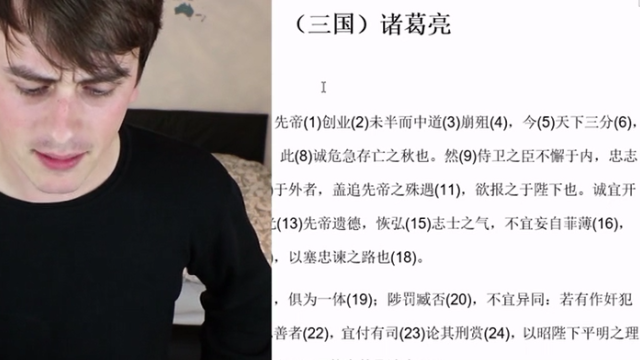英語方言大揭秘:當倫敦音遭遇威爾士英語
作者:滬江英語
來源:滬江英語
2011-11-29 10:00
With countless British accents shaped by thousands of years of history, there are few English-speaking nations with as many varieties of language in such a small space.
經過上千年歷史的演變,在講英語的國家中,很少有哪個國家像英國一樣,在這么個小地方擁有如此多的英語變種。
Received Pronunciation
標準發(fā)音
Received Pronunciation is the closest accent to “Standard British” that has ever existed in the UK.? Although it originally derives from London English, it is non-regional. The accent emerged from the 18th- and 19th-Century aristocracy, and has remained the “gold standard” ever since.
在英國,從來就不存在“標準英語”一說,與其最接近的就是標準發(fā)音了。標準發(fā)音發(fā)源于倫敦英語,但并不屬于地方發(fā)音。這種口音源于18、19世紀的英國貴族,自此,就成了發(fā)音的“黃金標準”了。
Cockney
考克尼(倫敦東郊貧民英語)
Cockney is probably the second most famous of British Accents. It originated in the East End of London, but shares many features with and influences other dialects in that region.
考克尼也許是除了標準發(fā)音之外的最有名的英國口音了??伎四嵩从趥惗貣|部,深受當?shù)氐钠渌窖缘挠绊?,也與它們有著很多共同特點。
Estuary English (Southeast British Accents)
河口英語(英國東南部口音)
Estuary is an accent derived from London English which has achieved a status slightly similar to “General American” in the US. Features of this accent can be heard around Southeast England, East Anglia, and perhaps further afield.
河口英語口音來源于倫敦英語,現(xiàn)在它在英國的地位有點類似于“通用美國英語”在美國的地位。河口英語口音分布在英格蘭東南部,東英吉利地區(qū),更遠的地方可能也有分布。
Geordie
基尼英語(英格蘭東北部口音)
Geordie usually refers to both the people and dialect of Newcastle-Upon-Tyne, in Northeast England. The word may also refer to accents and dialects in Northeast England in general.
基尼英語指從英格蘭東北部的紐卡斯爾到泰恩河之間的區(qū)域,人們所講的方言。這一地區(qū)的人也叫做基尼人。基尼英語也可泛指英格蘭東北部的口音和方言。
Midlands English
中部英語
Midlands English is one of the more stigmatized of English dialect groupings. The most famous of these dialects is Brummie.
中部英語在英語方言群中比較有標志性。其中最有名的當屬伯明翰口音了。
Northern England English
北英格蘭英語
These are the accents and dialect spoken north of the midlands, in cities like Manchester, Leeds, and Liverpool. Related accents also found in rural Yorkshire.
英格蘭中北部包括曼徹斯特、利茲、利物浦等地所說的英語都屬于此類。約克郡郊區(qū)也有類似的口音。
Welsh English
威爾士英語
This refers to the accents and dialects spoken in the country of Wales. The speech of this region is heavily influenced by the Welsh language, which remained more widely spoken in modern times than the other Celtic languages.
威爾士英語指在威爾士地區(qū)的口音和方言。威爾士語對這里的英語影響很深。而且,威爾士語也是現(xiàn)代社會中使用最廣泛的蓋爾特語言了。
Welsh is spoken natively in Wales. The Welsh Language Board indicated in 2004 that 611,000 people were able to speak Welsh. Although Welsh is a minority language, support for the language grew during the second half of the 20th century. The Welsh Language Act 1993 and the Government of Wales Act 1998 provide that the Welsh and English languages be treated equally in the public sector.
威爾士語是威爾士地區(qū)使用的母語。根據(jù)2004年的調查,約有61萬人會說威爾士語。盡管這是個小語種,但在20世紀下半葉開始,威爾士語的傳承和發(fā)展就得到了很大的支持。在1993年和1998年分別通過了兩項威爾士語法案,確立了公共部門中威爾士語和英語的同等地位。
Scottish English
蘇格蘭英語
This is the broad definition used to describe English as it is spoken in the country of Scotland. Note that Scottish English is different than Scots, a language derived from Northumbrian Old English that is spoken in Scotland as well.
蘇格蘭英語用以泛指蘇格蘭地區(qū)所說的英語。請注意,蘇格蘭英語和蘇格蘭語是不同的。蘇格蘭語源于諾森伯蘭地區(qū)的古英語,現(xiàn)在在蘇格蘭地區(qū)人們也在使用(這里所說的蘇格蘭語指的是在蘇格蘭地區(qū)使用的蘇格蘭蓋爾語,在蘇格蘭地區(qū),包括電視臺、報紙雜志、路名路牌都是用蘇格蘭蓋爾語和英語兩種語言來標示的)。











